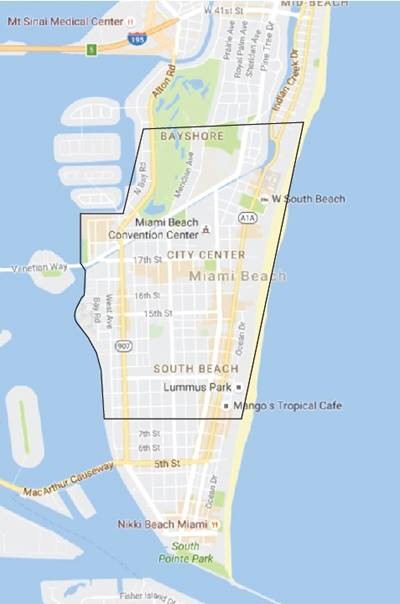Florida health officials and the Centers for Disease Control and Prevention (CDC) investigating cases of locally transmitted Zika virus. An additional area of active Zika transmission has been identified in a section of Miami Beach, in addition to the area of active Zika transmission near Wynwood.

The Florida Department of Health (DOH) believes that active transmission of this virus are only occurring in the area of Miami Beach between 8th and 28th streets.
DOH says that five individuals that have already been confirmed as cases of local transmissions of Zika are connected to the Miami Beach area.
This is the second area that has been identified as a location where local transmission is occurring and is just under 1.5 square miles. After aggressive testing in the Wynwood area, today DOH is able to clear three additional blocks of the Northeastern area of Wynwood because there is no continued evidence of active transmission. This is in addition to the 14 blocks DOH has already been able to clear in Wynwood.
The total number of local transmissions of Zika in Florida is 36.
Governor Rick Scott said, “Following today’s news, I am asking the CDC for an additional 5,000 Zika antibody test kits to ensure we can quickly test people for the virus and additional lab support personnel to help us expedite Zika testing. Also, to continue protecting pregnant women, I am renewing my call to the Obama Administration for an additional 10,000 Zika prevention kits. Additionally, we still need a detailed plan on how they would like us to work with FEMA now that this has become mosquito-borne in our state.
“Just like when we learned of transmission in Wynwood, the county has already begun an aggressive mosquito eradication plan that includes additional spraying in Miami Beach.”
Based on this new information, CDC and Florida health officials are now recommending the following:
- Pregnant women should avoid travel to the designated area of Miami Beach, in addition to the designated area of Wynwood, both located in Miami-Dade County, because active local transmission of Zika has been confirmed.
- Pregnant women and their partners living in or who must travel to the designated areas should be aware of active Zika virus transmission and follow steps to prevent mosquito bites.
- Women and men who live in or who have traveled to the designated area of Miami Beach since July 14, 2016 should be aware of active Zika virus transmission; pregnant women should see their doctor or other healthcare provider about getting tested for Zika; and people who have a pregnant sex partner should consistently and correctly use condoms to prevent infection during sex or avoid having sex for the duration of the pregnancy.
- Pregnant women and their sexual partners who are concerned about potential Zika virus exposure may also consider postponing nonessential travel to all parts of Miami-Dade County.
- All pregnant women in the United States should be evaluated for possible Zika virus exposure during each prenatal care visit. Each evaluation should include an assessment of signs and symptoms of Zika virus disease (acute onset of fever, rash, arthralgia, conjunctivitis); their travel history; as well as their sexual partner’s potential exposure to Zika virus and history of any illness consistent with Zika virus disease to determine whether Zika virus testing is indicated.
- Women with Zika should wait at least 8 weeks after symptoms start before trying to get pregnant.
- Men with Zika should wait at least 6 months after symptoms start before couples try to get pregnant.
- Women and men without confirmed Zika who traveled to this area should wait at least 8 weeks before trying to get pregnant.
- Women and men who live in or frequently travel to this area and who do not have signs or symptoms of Zika should talk to their healthcare provider to inform their decisions about timing of pregnancy.
Related:


3 thoughts on “Zika transmission identified in Miami Beach”